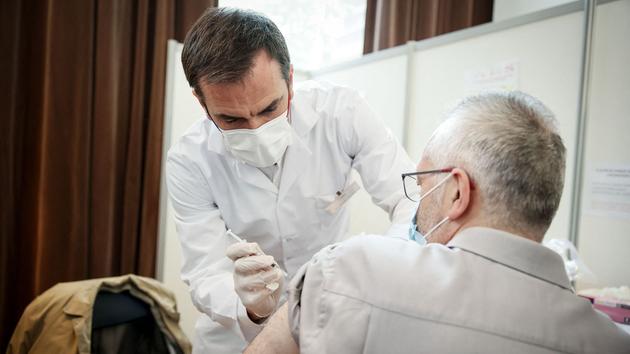The second stage of progressive deconfinement begins in a more than favorable epidemic context.
Mortality, new cases, beds occupied in intensive care: all the curves are weakening while the rhythm of vaccinations accelerates.
If the indicators are green, we are not yet out of the woods, warn the experts.
To discover
Covid-19: vaccination as the only remedy
Deconfinement: what will change this Wednesday for the French
To read also:
Vaccines: these young people who circumvent the rules to "find a normal life"
“We are on a very good trajectory, but we must remain cautious,
insists Simon Cauchemez, epidemiologist at the Institut Pasteur and member of the Scientific Council.
For the first time, our projections show that if we stick to this same dynamic and with a slightly higher vaccination rate, we will not be able to reverse the next wave, but rather avoid it! ”
But:
"If the decline slows down and we reach a plateau of new cases or hospitalizations, the situation could quickly deteriorate", warns the modeler.
A ridge line
As of May 17, the number of critical care and resuscitation patients had dropped to 4,186 from 6,000 at the peak a few weeks ago. The number of new cases over seven days is now 140 per 100,000 nationwide. This Monday, the number of hospital deaths due to Covid fell below 100 per day. It was the first time since mid-October 2020. But these figures should not make us forget that France is still advancing on a ridge line.
"There is indeed a very significant decline but we were starting from very high figures, and the dynamic of decline is actually less rapid than during the two previous waves,
moderates Professor Philippe Amouyel, professor of public health at the University Hospital of Lille.
In addition, regarding the incidence, there are geographical disparities and many departments remain above 150 per 100,000 new cases per week;
Seine-Saint-Denis is even still above the maximum alert threshold. ”
Read also:
Covid-19: will France keep its vaccination targets?
Cautious but optimistic too, Antoine Flahault, director of the Institute for Global Health at the University of Geneva, wants to believe that the French decline will continue.
“Our 7-day forecasting tool developed by the University of Geneva with the Federal Polytechnics of Lausanne and Zurich, indicates a drop below the 10,000 cases per day mark, 8,500 might even be possible on May 24th. . "
For the expert, the type of deconfinement chosen by France
"does not seem to have a high risk of contamination"
. Health protocols that better target air quality would however be useful in limiting the impact of upcoming reopening.
“The major role of aerosols in contamination is not yet sufficiently taken into account. There is no longer any doubt, the places of contamination are the poorly ventilated rooms, with people and where you stay long enough
,
”
recalls Antoine Flahault. The Ministry of Labor published on Tuesday an update of the sanitary protocols in the company and the emphasis is on
"new ventilation instructions"
. It is also recommended to
"promote the measurement of carbon dioxide in the air"
. CO2 detectors and air purifiers may become more and more part of the landscape in enclosed spaces, but aerosols also exist outdoors.
“When you smell cigarette smoke on a terrace, it shows you the persistence of these aerosols,
illustrates Philippe Amouyel.
The use of fans on the terrace could be useful to limit this stagnation.
And it seems to me that framing the reopening by a criterion of distance rather than a gauge would have been more effective. "
To be reactive
Screening, in the laboratory, pharmacy or via self-tests, will remain essential to curb the epidemic, the evolution of which will depend on individual behavior but also on the capacity of the public authorities to be reactive in the face of possible local resurgences of the virus.
“The retrospective search of all contact cases is facilitated when the number of cases decreases. It is essential that the health authorities seek all chains of transmission without exception and that positive cases are effectively isolated
,
”
insists Antoine Flahault.
The monitoring of wastewater carried out by the Epidemiological Observatory of Wastewater (Obépine) could prove invaluable.
“The more we are vaccinated, the less we will be tested. A reduction in tests is therefore to be expected and it will be more important than ever to have alternative epidemiological indicators,
explains Vincent Maréchal, virologist, co-founder of Obépine.
Wastewater is not very dependent on individual behavior and is a good thermometer when tests are less frequent. "
The virologist hopes to soon be able to analyze the diversity of viral genomes circulating on a national scale in this wastewater. This could make it possible to identify new strains or new variants.
“The population is not completely protected while natural and vaccine immunity increases. However, this can promote the selection of variants capable of escaping immunity, ”
warns the scientist.

